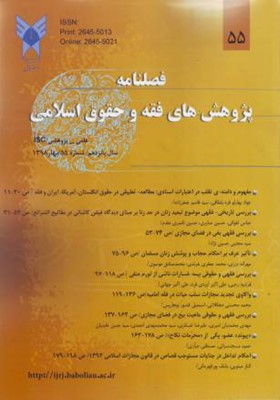احکام تداخل در جنایات مستوجب قصاص در قانون مجازات اسلامی 1392
محورهای موضوعی : حقوق خصوصی
الناز مینویی
1
,
بابک پورقهرمانی
2
![]()
1 - کارشناسی ارشد حقوق جزا وجرمشناسی، واحد مراغه، دانشگاه آزاد اسلامی، مراغه، ایران
2 - استادیار گروه حقوق کیفری وجرم شناسی، دانشکده علوم انسانی، واحد مراغه، دانشگاه آزاد اسلامی، مراغه، ایران
کلید واژه: تداخل, قصاص, جنایات, تعدد, قانون مجازات اسلامی 1392,
چکیده مقاله :
یکی از نوآوریهای قانونِ مجازات اسلامی 1392 تداخلِ جنایات میباشد که در فقه با عنوان تداخلِ اسباب مطرحشده است و منظور این است که جنایات عمدی متعدد و مختلفی با ضربه واحد یا متعدد از سوی جانی بر مجنی علیه وارد گردد. قانون مذکور با اختصاص فصل دوم از کتاب قصاص به موضوع تداخلِ جنایات، سعی کرده است خلأهای قانون قبلی را مرتفع نماید. بااینکه در جنایات اصل بر عدمِ تداخل آنها است، اما در موارد خاص تداخل در جنایات پذیرفتهشده است. به این نحو که هرگاه جنایات متعددی از سوی مرتکب بر مجنیعلیه، با یک ضربه واردشده باشد تداخل صورت میگیرد. درصورتیکه با ضربات متعدد جنایات متعددی وارد شود، در صورت متوالی بودن ضربات مؤثر در قتل تداخل صورت میگیرد در غیر این صورت تداخل صورت نمیگیرد
One of the notable innovations in the Islamic Penal Code Adopted in 2014 concerns its attention to ‘Interference of Crimes’ which is known as the ‘Interference of Reasons’ under Islamic Jurisprudence denoting different and various intentional crimes perpetrated with a single or multiple strikes by the criminal to the victim. The mentioned law, over the 2nd chapter of the Book of lex talionis (Qisas), elaborates the issue of ‘Interference of Crimes’ aiming to obviate the legal vacuum. Although in the occurrence of crimes the main prevalent principle is non-interference of reasons but, in some specific cases the interference of reasons has been accepted as such that whenever multiple crimes are perpetrated by the criminal against the victim through a single strike, interference of reasons has happened, when various crimes occur through various strikes and the interference of reasons happens if the strikes are done consecutively; otherwise, no interference of reasons is envisaged.
نجفی، محمدحسن، (1404)، جواهر الکلام فی شرایع الاسلام، جلد42و43، دار احیاء التراث العربی، بیروت.
_||_Ameli, Z.A. (1990). Al-Rozah Bahiyah fi Sharh Lomeh Dameshqiyah. Qom: Davari Bookshop.
Amid, H. (1984). Amid Persian dictionary. Tehran: Amir Kabir Publication.
Aqaeinia, H. (2014). Exclusive criminal law. Tehran: Mizan Publication.
Elahimanesh, M. R., Moradi, M. (2013). Crimes against persons. Tehran: Mizan Publication.
Haeri, A.M. (1998). Riyazol Masael fi Tahqiq Ahkam bel Dalael. Qom: Aal Bayt Institute.
Hajidehabadi, A. (2010). Rules of criminal law (2nd ed.). Qom: Sobhan Publication.
Hajidehabadi, A. (2015). Islamic penal code 2013 in the context of retaliatory interference. Islamic Law and Jurisprudence, 48(2), 225-247.
Helli, F.M. (1959). Izah Favaed fi Sharh Moshkelat Qavaed. Qom: Esmaeilian Institute.
Hur Amelim M.H. (1989). Vasaelol Shiah Ela Tahsil Masael Shareiyah. Qom: Aal Bayt Institute.
Ibn Boboyeh, M. A. (2005). Man La Yahzarah Faqih. Qom: Islamic Publication Office.
Kashani, R. (1990). Qesas Lel Foqaha va Khavas. Qom: Community of Teachers.
Khansari, A.Y. (1985). Jameol Madarek fi Sharh Mokhtasar Nafe. Qom: Esmaeilian Institute.
Khoei, A. Q. (2007). Taklamah Menhaj. Qom: Khoei's works Institute.
Koleyni, A.J. (1987). Al-Kafi. Qom: Darol Kotob Islamiyah.
Marashi, Sh. (1995). Al-Qesas Ala Zoe Quran val Sonah. Qom: Ayatollah Marashi Najafi Institute.
Mazroei, R. (2015). Detailed explanation of Islamic penal code. Qom: Judiciary.
Moradi, H. (2017). Crimes against persons (crimes) (1st ed.). Tehran: Mizan Publication.
Mousavi, R. (1988). Tahrirol Vasilah. Qom: Esmaeilian Institute.
Mozafar, M. R. (2011). Principles of jurisprudence. Qom: Darol Fekr Publication.
Najafi, M.H. (1984). Javaherol Kalam fi Sharaye Islam. Beirut: Dar Ehya Torath Arabi.
Sadeghi, H. (2014). Exclusive criminal law 1. Tehran: Mizan Publication.
Sadooq, M. A. (1994). Man La Yahzarah Faqih. Qom: Community of Teachers.
Tousi, A. (1987). Tahzib Ahkam. Tehran: Darol Kotob Islamiyah.
Tousi, A. J. (2008). Al-Mabsout fi Fiqh Imamiyah. Tehran: Islamic Publication.
Zeraat, A. (2014). Interpretation of Islamic punishment code 2013. Tehran: Javdaneh Jangal.
Zeydan, A. K. (2015). Retaliation and blood-money in Islamic religion. Tehran: Majd Publication.


